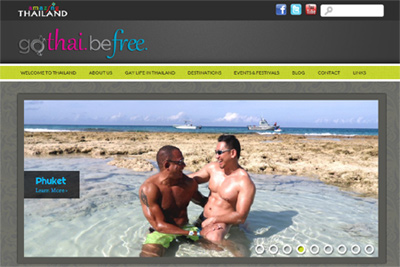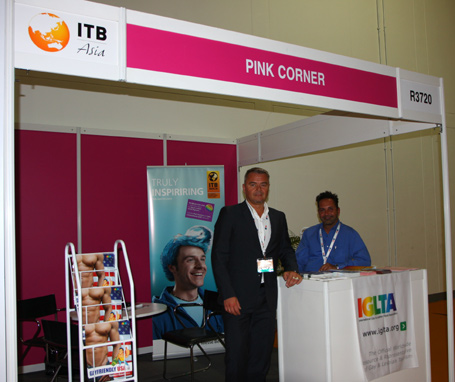It’s the first time a Pink Corner is being hosted at ITB Asia, a major travel trade show for tourism suppliers held for the fifth year in Singapore from October 17-19, 2012.
Managed by ITB Berlin, the world’s leading travel show, and its LGBT partner Diversity Tourism UG, the organisers are looking to see if there’s a similar demand in Asia since officially establishing a Gay and Lesbian Pavilion at its main show in Berlin in 2010. At ITB Berlin in March this year, the pavilion featured more than a dozen exhibitors and covered a display area of about 200 square metres.
Also represented at the booth are International Gay & Lesbian Travel Association (IGLTA) and Germany-based Tomontour.com that is part of Diversity Tourism UG and publishes gay travel guides about the USA and other gay-friendly parts of the world.
While gay and lesbian travel has been identified as one of the fastest growing market segments with large potential for further growth, it is still a segment that “dare not speak its name” in some markets, as evidenced by the popular use of its euphemistic codename: pink, whenever referring to LGBT.
Earlier this month, in calling the Pink Corner “a major achievement for Singapore”, Traveldailynews.asia quoted Rika Jean-Francois, key manager in charge of corporate social responsibility for ITB Berlin, as saying that she had run into trouble while trying to establish a LGBT travel presence at the event in Singapore. “We tried to have a small gay and lesbian travel corner last year but we were rebuffed by the Singapore Tourism Board. They told us that such a corner cannot be accepted in Singapore”, she was quoted as saying.
When this reporter asked organisers to clarify the above, Neeta Lachmandas, Assistant Chief Executive, Singapore Tourism Board said at the opening press conference on Wednesday: “We never had a conversation with Messe Merlin last year neither did we rebuff anything last year. At the end of the day our view is very simple. ITB is a commercial event, and is obviously going to be driven by commercial motivations.”
She noted that Singapore is at “different levels of maturity (from other) markets”. She added: “This is not Europe or the US. I think the conversation that transpired with Messe Berlin was basically that we're different markets but at the end of the day, it's a commercial decision and it's up to Messe Berlin to decide whether from a commercial perspective it makes sense. The proof of that pudding is that we do see that there is a LGBT stand [at the event this year].”
ITB Asia executive director, Nino Gruettke, told Fridae in an interview that the event organiser independently decides what segments – gay or otherwise – can be presented at the events and no approval is needed from other parties.
Recognising the LGBT focused travel segment as a high growth segment, he says the Pink Corner serves as a listening post to gather feedback from buyers and suppliers to determine if Berlin’s Gay and Lesbian Pavillion can be a “copy and paste for Asia”.
Dr Martin Buck, Vice President of event organiser Messe Berlin (Singapore), said at the press conference: “We try to reflect everything that's going on in the market adequately at the show and since the LGBT segment is something that is growing, (it) translates into something that buyers want to see. Commercial interests are often not identical with political or other interests so I think that it's only fair that we try to be as diverse as possible and I think this diversity always comes from what can be seen as market needs.”

Above: Gothaibefree.com is a website launched by the
Tourism Authority of Thailand – NY office to target gay and lesbian travelers.
Top of page: Thomas Bömkes and Tom Dedek (right) of Tomontour.com
at the Pink Corner at ITB Asia.
While there are no figures available on what the LGBT travel market in the Asia Pacific region is worth, industry research group PhoCusWright says the AP region is set to continue to lead as the world’s fastest-growing travel region next year, reaching US$357 billion, a 64% increase over 2009.
Thomas Bömkes, a LGBT consultant for ITB Berlin and managing director of Diversity Tourism UG, a consulting and marketing agency, says despite promoting the segment as LGBT travel, most LGBT travelers just want to be treated as regular guests although they may have specific needs such as knowing that the destinations are safe for LGBTs and that they do not encounter any fuss or prejudice when asking for a double bed as a same-sex couple, the most cited example of whether a hotel is gay-friendly.
While Thailand and Bali have been popular destinations for LGBT travelers for years or even decades, India, Cambodia and other parts of Asia are fast emerging as popular destinations although many are not supported by their respective national tourism organisations.
Last November, LGBT-focused tour operator Out Journeys and several other travel agents hosted a familiarisation trip for LGBT media and a gay and lesbian travel symposium in New Delhi to promote inbound LGBT travel despite not getting any support from the Tourism Ministry. Instead the symposium was co-sponsored by Tourism Authority of Thailand (TAT). The Tourism Authority of Thailand – NY office also operates Gothaibefree.com, a website targeting gay travelers.
This year, the Hong Kong Tourism Board has for the first time listed Pink Season on its official Discoverhongkong.com website after organisers sought them out.

